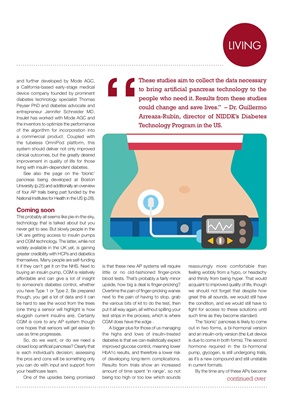
KITLIVING
and further developed by Mode AGC,
a California-based early-stage medical
device company founded by prominent
diabetes technology specialist Thomas
Peyser PhD and diabetes advocate and
entrepreneur Jennifer Schneider MD.
Insulet has worked with Mode AGC and
the inventors to optimize the performance
of the algorithm for incorporation into
a commercial product. Coupled with
the tubeless OmniPod platform, this
system should deliver not only improved
clinical outcomes, but the greatly desired
improvement in quality of life for those
living with insulin-dependent diabetes.
See also the page on the 'bionic'
pancreas being developed at Boston
University (p.) and additionally an overview
of four AP trails being part funded by the
National Institutes for Health in the US (p.).
Coming soon
This probably all seems like pie-in-the-sky,
technology that is talked about but you
never get to see. But slowly people in the
UK are getting access to insulin pumps
and CGM. The latter, while not highly
used in the UK, is increasingly being used,
though many people are self-funding it
if they can't get it on the NHS. Next to
buying an insulin pump, CGM is relatively
affordable and can give a lot of insight
to someone's diabetes control, whether
you have Type 1 or Type 2. Be prepared
though, you get a lot of data and it can be
hard to see the wood from the trees, as
it were. One thing a sensor will highlight
is how sluggish insulin really is. Certainly
CGM is core to any AP system.
So, do we want, or do we need a
closed loop artificial pancreas? Clearly that
is each individual's decision; assessing
the pros and cons will be something only
you can do with input and support from
your healthcare team.
One of the upsides being promised
is that these new AP systems will require
little or no old-fashioned finger-prick
blood tests. That's probably a fairly minor
upside, how big a deal is finger-pricking?
Overtime the pain of finger-pricking wanes
next to the pain of having to stop, grab
the various bits of kit to do the test, then
put it all way again, all without spilling your
test strips in the process.
A bigger plus for those of us managing
the highs and lows of insulin-treated
diabetes is that we can realistically expect
improved glucose control, meaning lower
HbA1c results, and therefore a lower risk
of developing long-term complications.
Results from trials are all also showing
an increased amount of time spend
'in range', so not being too high or too
low which sounds reassuringly more
comfortable that feeling wobbly from a
hypo, or feeling headachy and thirsty
from being hyper. That would acquaint to
improved quality of life, though we should
not forget that despite how great this all
sounds, we would still have the condition,
and we would still have to fight for access
to these solutions until such time as they
become standard.
The 'bionic' pancreas is likely to
come out in two forms, a bi-hormonal
version and an insulin-only version, both
in the form of a iLet device. The second
hormone required in the bi-hormonal
pump, glycogen, is still undergoing
trials, as it's new and unstable in current
formats.
By the time any of these APs become
"
These studies aim to collect the data necessary
to bring artificial pancreas technology to the
people who need it. Results from these studies
could change and save lives." - Dr. Guillermo
Arreaza-Rubín, director of NIDDK's Diabetes
Technology Program in the US.